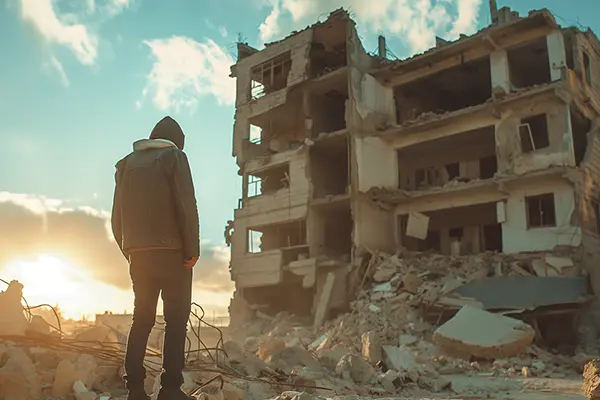Hopes Fade as Hamas Negotiators Depart Cairo Without Cease-Fire Breakthrough
Hamas negotiators have exited Cairo without achieving a consensus on cease-fire discussions in the Gaza Strip, leaving a tense air as the Israel-Hamas conflict continues with no end in sight. This stalemate arises despite proposed negotiations for a 40-day truce aligning with the beginning of Ramadan, which would entail an exchange of Israeli hostages for Palestinian prisoners—a tenfold disparity that underscores the depth of the deadlock.
Yahya Sinwar, who until recently hardly participated in the negotiations, demands that Israel commit itself to discussing a final cessation of hostilities, which puts him at odds with other Hamas leaders.
Egyptian officials said Sinwar believes Hamas currently has the upper hand in negotiations, citing internal political divisions within Israel, including the split in Prime Minister Benjamin Netanyahu’s government during the war and growing U.S. pressure on Israel to do more to alleviate the suffering of Gazans.
Hamas’s Demands and Israel’s Stance
In the intricate dance of diplomacy and demands, the cease-fire talks between Israel and Hamas have been fraught with contention, each party holding fast to its non-negotiable conditions:
- Hamas’s Key Demands:
- An immediate end to the war and withdrawal of Israeli forces from Gaza.
- A complete lifting of the Israeli-Egyptian blockade, in place since 2007, to allow the free flow of goods and people.
- The opening of all border crossings, including the vital Rafah crossing with Egypt.
- Expansion of the fishing zone from 6 to a proposed 20 nautical miles.
- Construction of a new seaport and airport in Gaza, a demand persistently rejected by Israel and Egypt.
- The release of Palestinian prisoners, with a focus on those rearrested after the 2011 swap deal.
- A comprehensive and permanent cease-fire agreement, as opposed to temporary pauses.
- Israel’s Stance and Conditions:
- Rejection of a cease-fire unless Hamas disarms and renounces violence.
- A mechanism within any agreement to prevent Hamas from rearming.
- Security arrangements to prevent future rocket attacks and violence from Gaza.
- The demilitarization of the Gaza Strip, a condition flatly refused by Hamas.
- While Israel agreed to a prisoner exchange, it remains reluctant to release prisoners with “blood on their hands”.
- Israel’s counter-offers include increasing fuel supply, expanding the fishing zone to 12 nautical miles, and more permits for Palestinian workers, which have been deemed insufficient by Hamas.
- The chasm between the two sides is stark, with Israel’s security concerns clashing with Hamas’s demands for sovereignty and relief from the blockade. The failure to bridge these differences has led to the departure of Hamas negotiators from Cairo without a breakthrough, and with Israel reportedly staying away from talks due to Hamas’s refusal to provide a list of living Israeli captives, the path to peace remains obstructed.
Expert Opinions and Analysis
- Mark Dubowitz’s Perspective on Hamas’s Strategy:
- According to Mark Dubowitz, CEO of the Foundation for Defense of Democracies (FDD), Hamas appears to be pursuing a strategy where it seeks the advantages of a ceasefire without giving up its commitment to armed conflict. This stance complicates the negotiation process, as it suggests an underlying reluctance to engage in genuine peace efforts.
- Joe Truzman’s Insights on Regional Dynamics:
- Joe Truzman, a Senior Research Analyst for FDD’s Long War Journal, points out that the Rafah border crossing remains a significant target for Israeli forces. He emphasizes that Egypt should clarify that Hamas’s actions are the reason for the ongoing tension, thus placing the responsibility on Hamas for the lack of progress in ceasefire talks.
- The Timing of Tensions and U.S. Involvement:
- The period leading up to Ramadan is critical, with Hamas accused of attempting to escalate tensions between Israelis and Palestinians during this sensitive time. Concurrently, the United States is exerting pressure for a deal to be reached before the start of Ramadan, highlighting the urgency felt by international actors to resolve the conflict.
Stumbling Blocks in Negotiations
The seemingly insurmountable stumbling blocks in the negotiations between Israel and Hamas are deeply rooted in historical and ideological divides:
- Trust Deficit:
- Previous cease-fires have been ephemeral, with each side alleging violations by the other, perpetuating a cycle of mistrust that hampers any progress towards a lasting agreement.
- Entrenched Hostilities:
- The mutual fear and hatred harbored by both parties render reconciliation and compromise distant prospects. This animosity has been a persistent barrier to peace efforts.
- Demographic Concerns:
- Israel’s reluctance to risk losing its Jewish majority status and Palestine’s resistance to the presence of any Jewish citizens reflect deep-seated demographic fears that pose critical challenges to the negotiation process.
- Recognition and Acceptance:
- The Palestinian refusal to recognize the state of Israel has been a consistent factor leading to the collapse of multiple peace initiatives in the past. Without mutual recognition, the path to peace remains fraught with obstructions.















Leave a Reply